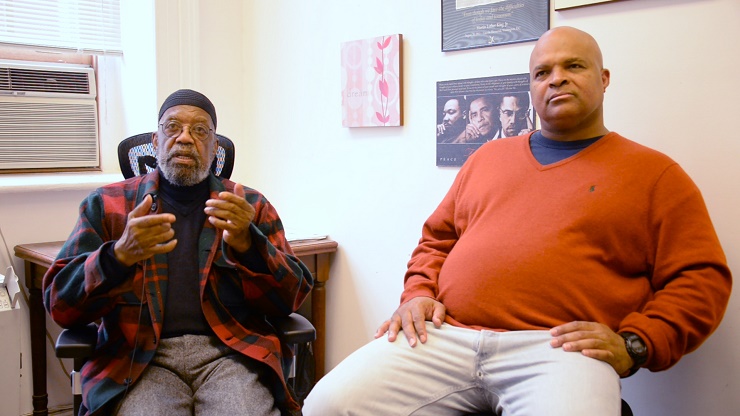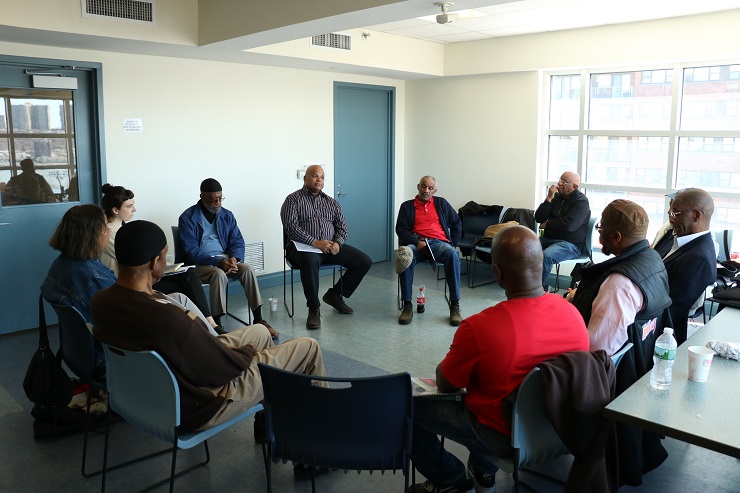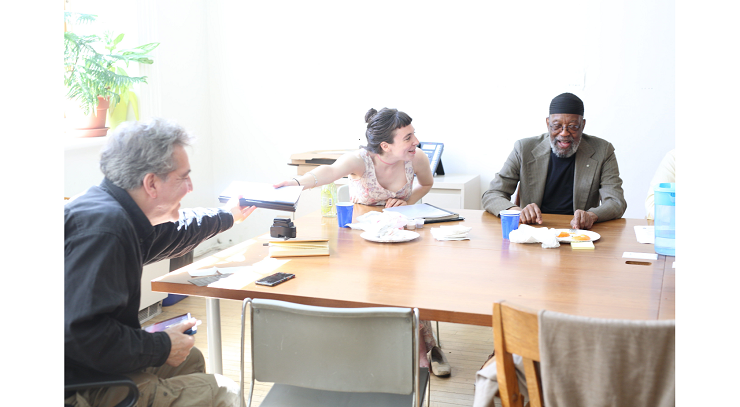
Larry White and Russell Tucker Nathaniel Doubleday / AFSC
Larry White and Russell Tucker served 32 and 23 years in prison, respectively. They tirelessly seek to reform the criminal justice system. Larry is the founder of Hope Lives for Lifers and a public speaker on prison issues and preventing recidivism. Russell works for Phoenix House, a drug rehabilitation and re-entry program that works on inner reflection and reform. In the second installment of this two–part interview (part one found here) they share stories from life inside prison and how they’ve found strength, safety, and growth through the American Friends Service Committee.
Christina Elcock: How did you find out about this program and this safe space?
Larry White: I first became aware of AFSC while I was serving time in prison. I had a life sentence and served 32 years. During that time, we started developing what we called non-traditional programs which are programs for and developed by prisoners. In doing that, we came across the Quakers, they had a religious organization inside the prison system and we used to go down and talk to them. When I was finally released to come home, I got back into contact with AFSC. I met Lewis Webb who is in charge of their Healing Justice program. He asked me if I had any problems after leaving prison, and I told him I had social anxiety because I hadn’t been used to the outside world for 32 years. I was unsure of myself, I’d lost a lot of confidence – I didn't know anything about computers and stuff like that. So, Lewis said I could come down and use the computers. He would let other people who were just coming home from prison do the same.
Russell Tucker: I was inside with Larry and he was facilitating classes called non-traditional post-criminal justice and he drummed into us these ideas of being involved in the community, so when I got out, I searched for him. I started working at Fortune Society – he was there prior to me, and they told me he was at AFSC. So, I left Fortune Society and came to where he was at AFSC to continue to do work that we had started inside: community activism, reintegration work and taking part in the political, social, religious aspects of our community.

Christina: What else are you learning from this experience?
Russell: For me growth has come in many different was. First, the programs and the events that we host or take part in has helped me develop by speaking to other people, talking about the program, and just interacting with different groups. But, it happened in so many other different ways, for example, at AFSC, we rented a charter bus and took a trip to Albany to listen to the hearings of people who were incarcerated and actually participate in the debates ourselves. That was a change for me because now I was on the other side of the fence, now I'm a free man listening to the debates about the people who are inside. I remember bright and early one morning we were going to Albany, we had this really big charter bus and just before I got on, I stood in front of the bus steps and said, "this is the first time I'm going on a charter bus without being shackled; this time, I was free.”
Larry: When you go to prison everything changes. Life in the free world, as we refer to it in prison, is something we take a lot for granted. What going to prison really means is losing your ability to make decisions on your own. You're told when to sleep, when to eat, when to move, you're given a uniform you have to wear – you lose all your autonomy in the prison system, and your life becomes fixed. No one tells you how to serve your sentence and still hold on to all the things and people you left behind. As far as the prison is concerned the idea is: Here's a rule book, follow that rule book, and any problems you have, we can't help you, you have to deal with that on your own. I served a 32-year sentence – that's over a quarter of a century! How can I do 32 years in prison in such a way so that when I'm released I'm not a broken individual?
While I was in prison, I got together with some other people and we began to develop programs that addressed prisoners needs. We started teaching other prisoners about how they should develop their own causes, how they could develop their own potential and know that a person had to be aware of their own potential if they were to live a better life in street because otherwise, these things weren't being taught in the prison systems.

Christina: How has the program here at AFSC impacted your lives?
Russell: AFSC has been a safe haven for me. It's been a place where I could come and meet people who have the same commonalities. It’s been a place where we can build and learn and do things together. It has been a voice and has allowed us to have a platform. Under AFSC we've been able to visit other places and talk about Healing Justice and the programs that we have created. It has been a way to network and build a strong community. It has been home, so to speak, it has been a pleasure.
Larry: There's been a time where maybe 20 years have passed and I've met people on the outside that I knew through the prison system and they say, "I thought you were dead, I've not seen you in all these years." And then about a week or two later they say, "You've changed. You're not the same man I knew back then in the streets. You're different."
When I was in the streets, before I went to prison, it was all about me. Remember those trips outside of my community that I told you about with my grandmother and seeing the economic differences? That sparked something in me. I thought no matter what, it's now all about me. But once I came to prison and lived through the oppressive system, that changed. I was able to adapt to the oppressive prison system, but others weren't. It was when I looked around me and saw people who weren't surviving, people committing suicide because they couldn't stand that pressure that I began to feel angry. I found myself standing up for other people, and gradually began to feel for other people. I never had that in the streets.
When I came out of prison, I began to understand my people, and it's not all about race, either. The relationships you can develop in prison can feel almost like family. You can have a cell right next to somebody for years. You and that person may do something wrong and go up to the box (solitary confinement) where they don’t have anything up there. Whatever little bits you get, you share with the man next door. Have you ever seen those little sardine cans? There'd be about nine to 10 sardines in there, you take one out and you pass it down, everybody gets a piece, and you begin to feel for each other. When the police comes and beats that guy up, you feel it and it hurts me deep inside. So, I rise up and tell everybody to rise up, too. I got that feeling in prison, sister. Now I involve myself with people, it's not about me anymore. Prison helped me a great deal, I can't say prison was all bad. I came out a different person, I came out as a person who cares for other people.
Working with Lewis has helped us accomplish so much. We have developed this thing I have called the Freedom Auditorium; it’s a play about what happens in the prison system and when you come home. We have it at different churches and other places. We're going to other states and we're bringing in a new awareness to people in prison so they know that they don't have to commit a crime and that there are other ways to deal with different situations.
Russell: I bring the group I work with over here as well so Larry and Lewis can talk to them. It’s important they can understand that – since most of them are addicts – being sober is just not enough, you have to start healing internally, as well. I bring about 15 to 20 here, and Larry and Lewis talk to them about their responsibilities and how to get involved. This helps them out, and after some of them finish the program, they come back and get involved with AFSC.
Read more about how communities have taken steps to create Sanctuary Spaces here.
Related posts
Sanctuary Spaces: An introduction
Sanctuary Spaces: A place for healing from incarceration - part 1
Sanctuary Spaces: A place for healing from incarceration – part 2
Sanctuary Spaces: Pushing back oppressive systems from the inside out - part 1